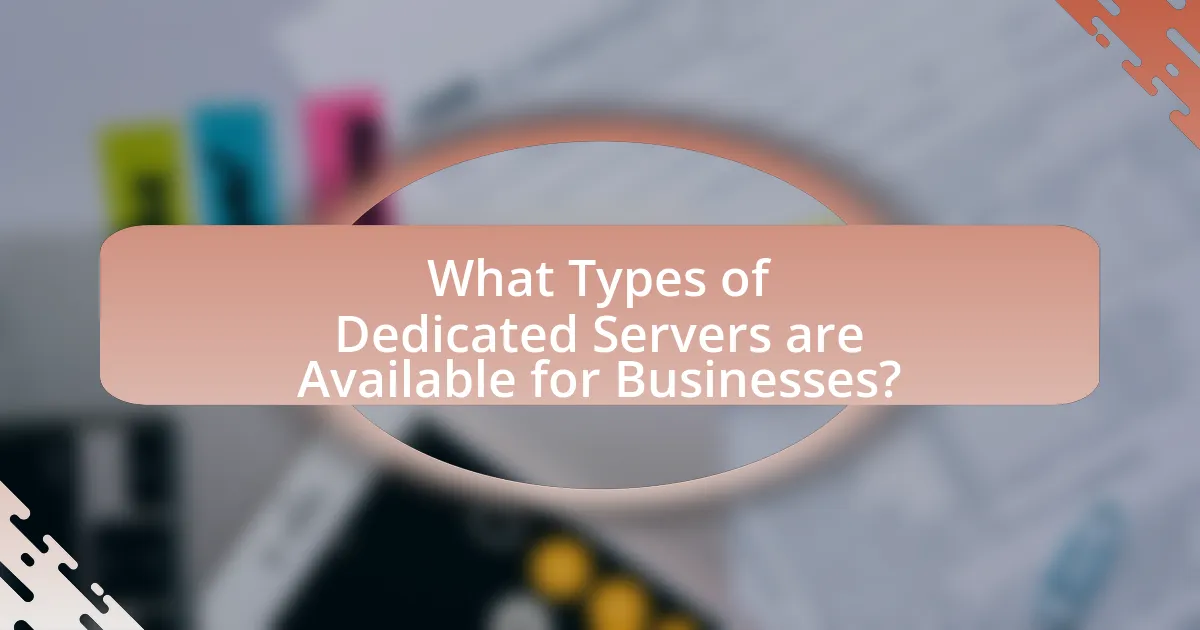A dedicated server is a hosting solution that allocates an entire physical server to a single client, providing exclusive access to its resources. This article outlines the importance of dedicated servers for businesses, highlighting their benefits such as enhanced performance, improved security, and greater control over server configurations. It differentiates dedicated servers from other hosting options, discusses key features, and examines factors influencing the choice of a dedicated server, including workload requirements, scalability, and budget considerations. Additionally, it explores various types of dedicated servers, the differences between managed and unmanaged options, and best practices for selecting a reliable server provider.

What is a Dedicated Server and Why is it Important for Businesses?
A dedicated server is a type of hosting service where an entire physical server is allocated to a single client, providing exclusive access to its resources. This exclusivity is crucial for businesses that require high performance, security, and customization, as it allows them to manage their server environment without interference from other users. Dedicated servers are important for businesses because they enhance website performance, improve security measures, and offer greater control over server configurations. For instance, according to a study by HostingAdvice, dedicated servers can handle significantly higher traffic volumes compared to shared hosting, making them ideal for businesses with growing demands. Additionally, dedicated servers reduce the risk of data breaches, as they are not shared with other clients, thus providing a more secure environment for sensitive information.
How does a Dedicated Server differ from other hosting options?
A Dedicated Server differs from other hosting options primarily in that it provides exclusive access to all server resources for a single user or organization. Unlike shared hosting, where multiple users share the same server resources, or VPS hosting, which allocates a portion of server resources to multiple users, a Dedicated Server ensures that all CPU, RAM, and storage are dedicated solely to one client. This exclusivity results in enhanced performance, greater control over server configurations, and improved security, as there are no other users on the same server that could potentially compromise its integrity.
What are the key features of a Dedicated Server?
A Dedicated Server offers several key features that enhance performance and security for businesses. Firstly, it provides exclusive resources, meaning all CPU, RAM, and storage are dedicated solely to one user, which leads to improved performance and reliability. Secondly, it allows for full customization, enabling users to configure hardware and software according to specific needs. Thirdly, Dedicated Servers offer enhanced security, as they are less vulnerable to attacks compared to shared hosting environments. Additionally, they provide root access, allowing complete control over server settings and configurations. Lastly, Dedicated Servers typically come with robust technical support, ensuring that any issues can be resolved quickly to minimize downtime. These features collectively make Dedicated Servers a preferred choice for businesses requiring high performance, security, and customization.
Why might a business choose a Dedicated Server over shared hosting?
A business might choose a Dedicated Server over shared hosting primarily for enhanced performance and control. Dedicated Servers provide exclusive resources, ensuring that the business’s applications run smoothly without the interference of other users, which is a common issue in shared hosting environments. This exclusivity leads to improved website speed, reliability, and security, as the server is not burdened by the demands of multiple clients. Additionally, businesses requiring specific configurations or software installations benefit from the full administrative access that Dedicated Servers offer, allowing for tailored solutions that meet unique operational needs.
What are the primary benefits of using a Dedicated Server?
The primary benefits of using a Dedicated Server include enhanced performance, increased security, and full control over server resources. Dedicated Servers provide superior performance because they allocate all resources exclusively to one user, ensuring optimal speed and reliability for applications and websites. Increased security is achieved as Dedicated Servers are less vulnerable to attacks compared to shared hosting environments, allowing for customized security measures tailored to specific needs. Additionally, users have full control over server configurations, enabling them to install any software and manage settings according to their business requirements. These advantages make Dedicated Servers a preferred choice for businesses that require robust performance and security.
How does a Dedicated Server enhance performance and reliability?
A Dedicated Server enhances performance and reliability by providing exclusive resources to a single user or organization, eliminating competition for bandwidth and processing power. This exclusivity allows for optimized server configurations tailored to specific application needs, resulting in faster load times and improved user experiences. Additionally, dedicated servers typically offer higher uptime rates, often exceeding 99.9%, due to their robust hardware and dedicated support, which ensures that any issues are promptly addressed. This combination of dedicated resources and reliable infrastructure significantly boosts overall performance and stability for business applications.
What security advantages does a Dedicated Server provide?
A Dedicated Server provides enhanced security advantages by isolating resources and data from other users. This isolation minimizes the risk of data breaches and unauthorized access, as the server is not shared with other clients, unlike shared hosting environments. Additionally, Dedicated Servers allow for customized security configurations, enabling businesses to implement specific firewalls, intrusion detection systems, and security protocols tailored to their needs. This level of control is supported by the fact that dedicated environments can be monitored and maintained more rigorously, reducing vulnerabilities and ensuring compliance with industry standards such as PCI DSS for payment processing.

How to Determine Your Business Needs for a Dedicated Server?
To determine your business needs for a dedicated server, first assess your current and projected workload requirements, including the number of users, applications, and data storage needs. Businesses with high traffic websites or resource-intensive applications typically require dedicated servers to ensure optimal performance and reliability. For instance, a company experiencing over 1,000 daily visitors may need a dedicated server to handle the increased load effectively. Additionally, consider security requirements, as dedicated servers offer enhanced protection for sensitive data compared to shared hosting. Evaluating these factors will help you identify the specifications necessary for your dedicated server, ensuring it aligns with your operational demands.
What factors should you consider when assessing your server needs?
When assessing your server needs, consider factors such as workload requirements, scalability, budget, and security. Workload requirements involve understanding the applications and services that will run on the server, which helps determine the necessary processing power and memory. Scalability is crucial for future growth; ensure the server can accommodate increased demand without significant upgrades. Budget constraints dictate the type of server you can afford, including initial costs and ongoing maintenance. Lastly, security measures must be evaluated to protect sensitive data, which may involve compliance with regulations and implementing robust security protocols. These factors collectively guide the selection of a dedicated server that aligns with your business needs.
How do your website traffic and resource requirements influence your choice?
Website traffic and resource requirements significantly influence the choice of a dedicated server by determining the necessary specifications and capabilities needed to handle user demands effectively. High website traffic necessitates a server with greater bandwidth, processing power, and memory to ensure fast load times and reliable performance. For instance, a website experiencing over 10,000 daily visitors may require a server with at least 16 GB of RAM and a multi-core processor to manage concurrent requests efficiently. Conversely, lower traffic sites may operate effectively on servers with fewer resources, such as 8 GB of RAM. Therefore, aligning server specifications with anticipated traffic levels ensures optimal performance and user experience.
What role does scalability play in selecting a Dedicated Server?
Scalability is crucial in selecting a Dedicated Server because it determines the server’s ability to accommodate growth in traffic and resource demands. A scalable dedicated server allows businesses to easily upgrade their resources, such as CPU, RAM, and storage, without significant downtime or migration challenges. This flexibility is essential for companies experiencing fluctuating workloads or rapid growth, as it ensures that performance remains optimal and operational costs are managed effectively. For instance, a study by Gartner indicates that businesses that prioritize scalability in their IT infrastructure can reduce operational costs by up to 30% during periods of growth.
How can your budget impact your Dedicated Server selection?
Your budget significantly influences your Dedicated Server selection by determining the specifications, performance, and support options available. A higher budget allows for more powerful hardware, such as faster processors, increased RAM, and larger storage capacities, which can enhance server performance and reliability. Conversely, a limited budget may restrict choices to entry-level servers with basic features, potentially impacting the server’s ability to handle high traffic or resource-intensive applications. According to a report by HostingAdvice, businesses that invest adequately in dedicated servers often experience improved uptime and customer satisfaction, highlighting the correlation between budget allocation and server quality.
What are the typical costs associated with Dedicated Servers?
The typical costs associated with dedicated servers range from $100 to $500 per month, depending on specifications and service providers. Basic dedicated servers with standard configurations may start around $100, while high-performance servers with advanced features can exceed $500 monthly. Factors influencing these costs include hardware specifications, bandwidth, storage options, and additional services such as managed support. For instance, a server with a powerful CPU, ample RAM, and SSD storage will generally command a higher price compared to a basic model.
How can you balance cost and performance effectively?
To balance cost and performance effectively, businesses should conduct a thorough analysis of their specific requirements and usage patterns. This involves evaluating the necessary resources, such as CPU, RAM, and storage, against the budget constraints. For instance, a study by Gartner indicates that optimizing server configurations based on workload can lead to a 30% reduction in costs while maintaining performance levels. By selecting a dedicated server that aligns with actual usage rather than over-provisioning, companies can achieve a cost-effective solution without sacrificing performance.

What Types of Dedicated Servers are Available for Businesses?
Businesses can choose from several types of dedicated servers, including managed dedicated servers, unmanaged dedicated servers, cloud dedicated servers, and hybrid dedicated servers. Managed dedicated servers provide full support and maintenance from the hosting provider, allowing businesses to focus on their core operations. Unmanaged dedicated servers offer more control and flexibility, requiring businesses to handle server management themselves. Cloud dedicated servers combine the benefits of dedicated hardware with cloud technology, offering scalability and redundancy. Hybrid dedicated servers integrate both dedicated and cloud resources, providing a balance of performance and flexibility. Each type serves different business needs, ensuring that companies can select the most suitable option based on their operational requirements and technical expertise.
What are the differences between managed and unmanaged Dedicated Servers?
Managed dedicated servers provide comprehensive support and maintenance services, while unmanaged dedicated servers require users to handle all server management tasks independently. In managed services, the hosting provider takes care of server setup, monitoring, updates, and security, allowing businesses to focus on their core operations. Conversely, unmanaged servers offer greater control and customization options, but they demand technical expertise from the user to manage the server effectively. This distinction is crucial for businesses when selecting a server type, as it impacts operational efficiency and resource allocation.
How does a managed Dedicated Server benefit businesses lacking technical expertise?
A managed Dedicated Server benefits businesses lacking technical expertise by providing comprehensive support and maintenance, allowing them to focus on their core operations without the burden of server management. This service includes 24/7 monitoring, security updates, and troubleshooting, which ensures optimal performance and protection against cyber threats. According to a study by the International Data Corporation, 70% of small to medium-sized businesses reported improved operational efficiency when utilizing managed services, highlighting the effectiveness of such solutions for companies without in-house IT capabilities.
What responsibilities come with an unmanaged Dedicated Server?
An unmanaged dedicated server requires the owner to handle all aspects of server management, including system updates, security configurations, software installations, and troubleshooting. The owner is responsible for ensuring the server’s operating system is up to date, applying security patches, and configuring firewalls to protect against unauthorized access. Additionally, the owner must monitor server performance, manage backups, and ensure data integrity. According to industry standards, unmanaged servers typically do not include technical support from the hosting provider, placing the onus of maintenance and problem resolution entirely on the server owner.
What are the various configurations of Dedicated Servers?
Dedicated servers can be configured in various ways to meet specific business needs. Common configurations include single-processor servers, which are suitable for basic applications; dual-processor servers, offering enhanced performance for more demanding tasks; and multi-processor servers, designed for high-performance computing and large-scale applications. Additionally, dedicated servers can be configured with different amounts of RAM, storage types (HDD or SSD), and network capabilities, allowing businesses to tailor their server to their workload requirements. For instance, a server with SSD storage provides faster data access compared to traditional HDDs, which can significantly improve application performance.
How do hardware specifications affect server performance?
Hardware specifications directly influence server performance by determining processing speed, memory capacity, storage efficiency, and network capabilities. For instance, a server equipped with a multi-core processor can handle more simultaneous tasks compared to a single-core processor, leading to improved performance in multi-threaded applications. Additionally, higher RAM capacity allows for better multitasking and faster data access, which is crucial for applications requiring significant memory resources. Storage type also plays a role; solid-state drives (SSDs) provide faster read/write speeds than traditional hard disk drives (HDDs), enhancing data retrieval times and overall system responsiveness. Furthermore, network interface specifications affect data transfer rates, impacting how quickly a server can communicate with other devices. These relationships between hardware specifications and performance metrics are well-documented in industry benchmarks, such as those from SPEC and PassMark, which illustrate the performance differences based on varying hardware configurations.
What operating systems are commonly used on Dedicated Servers?
Commonly used operating systems on dedicated servers include Linux distributions such as Ubuntu, CentOS, and Debian, as well as Windows Server editions. Linux is favored for its stability, security, and open-source nature, making it a popular choice among developers and businesses. Windows Server is often selected for applications that require Microsoft technologies, providing a familiar environment for users accustomed to Windows. The prevalence of these operating systems is supported by their extensive community support, regular updates, and compatibility with various server applications.
What are the best practices for choosing a Dedicated Server provider?
The best practices for choosing a Dedicated Server provider include evaluating performance, reliability, support, and scalability. Performance is critical; select a provider that offers high-quality hardware and network infrastructure to ensure optimal speed and uptime. Reliability is essential; look for providers with a proven track record of minimal downtime and robust service level agreements (SLAs) that guarantee uptime percentages, typically above 99.9%. Support is vital; choose a provider that offers 24/7 technical support through multiple channels, ensuring assistance is available whenever needed. Scalability is important; select a provider that allows easy upgrades to accommodate future growth, ensuring that your server can adapt to changing business needs. These practices are validated by industry standards, where providers with high SLAs and comprehensive support are consistently rated higher by users in terms of satisfaction and performance.
How can you evaluate the reputation and reliability of a server provider?
To evaluate the reputation and reliability of a server provider, examine customer reviews, industry ratings, and uptime guarantees. Customer reviews on platforms like Trustpilot or G2 provide insights into user experiences, while industry ratings from sources like Gartner or IDC can indicate overall performance and reliability. Uptime guarantees, typically expressed as a percentage, reflect the provider’s commitment to service availability; for instance, a provider offering a 99.9% uptime guarantee is generally considered reliable. Additionally, check for certifications such as ISO 27001, which demonstrate adherence to security and operational standards.
What support services should you expect from a Dedicated Server provider?
A Dedicated Server provider should offer 24/7 technical support, hardware management, and network monitoring services. These support services ensure that any issues are promptly addressed, minimizing downtime and maintaining server performance. For instance, 24/7 technical support allows clients to receive assistance at any time, which is crucial for businesses that operate around the clock. Hardware management includes proactive maintenance and replacement of faulty components, ensuring reliability. Network monitoring services help in identifying and resolving potential security threats or performance bottlenecks, thus safeguarding data integrity and optimizing server efficiency.
What are some common pitfalls to avoid when selecting a Dedicated Server?
When selecting a Dedicated Server, common pitfalls to avoid include underestimating resource requirements, neglecting scalability options, and overlooking support and service level agreements. Underestimating resource requirements can lead to performance issues; for instance, a server with insufficient CPU or RAM may struggle under high traffic, impacting user experience. Neglecting scalability options can hinder future growth; choosing a server that cannot be easily upgraded may result in costly migrations later. Overlooking support and service level agreements can lead to inadequate assistance during critical times; a study by HostingAdvice found that 70% of businesses experienced downtime due to poor support, emphasizing the importance of reliable customer service.
How can misunderstanding your needs lead to poor server choices?
Misunderstanding your needs can lead to poor server choices by causing you to select a server that does not align with your business requirements, resulting in inadequate performance or unnecessary costs. For instance, if a business underestimates its data storage needs, it may choose a server with insufficient capacity, leading to slow performance and potential downtime. Conversely, overestimating needs can result in investing in high-end servers that exceed budget constraints without providing proportional benefits. According to a study by Gartner, 70% of organizations experience performance issues due to misalignment between server capabilities and actual workload requirements, highlighting the critical importance of accurately assessing needs before making server decisions.
What are the risks of choosing the cheapest option available?
Choosing the cheapest option available for a dedicated server can lead to significant risks, including poor performance, inadequate support, and potential security vulnerabilities. Low-cost servers often compromise on hardware quality, resulting in slower processing speeds and increased downtime, which can negatively impact business operations. Additionally, budget providers may offer limited customer support, leaving businesses without timely assistance during critical issues. Furthermore, cheaper options may lack essential security features, exposing sensitive data to breaches. According to a study by Gartner, organizations that prioritize cost over quality in IT infrastructure often face higher long-term costs due to increased maintenance and downtime.
What practical tips can help you choose the right Dedicated Server for your business?
To choose the right Dedicated Server for your business, assess your specific requirements such as performance, scalability, and budget. Performance is crucial; select a server with adequate CPU power, RAM, and storage to handle your workload efficiently. Scalability is important for future growth; ensure the server can be upgraded easily as your business expands. Budget considerations should include not only the initial cost but also ongoing maintenance and support expenses. According to a 2021 survey by HostingAdvice, 70% of businesses reported that performance and reliability were their top priorities when selecting a dedicated server, highlighting the importance of these factors in decision-making.


